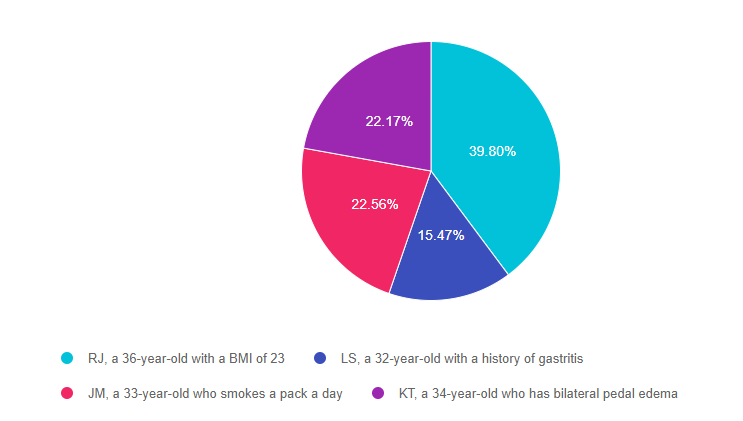
We quizzed test takers on the new ADA 2022 Standards of Care for Hyperglycemia. 39% of respondents chose the best answer. We want to share this important updated information, so you can pass it on to people living with diabetes and your colleagues, plus prepare for exam success!
Before we start though, if you don’t want any spoilers and haven’t tried the question yet, you can answer below: Answer Question
Question: Based on the 2022 ADA Standards of Care and Screening Guidelines, which one of the following people would need to be tested for hyperglycemia?
Answer Choices:
- RJ, a 36-year-old with a BMI of 23
- LS, a 32-year-old with a history of gastritis
- JM, a 33-year-old who smokes a pack a day
- KT, a 34-year-old who has bilateral pedal edema

As shown above, the most common choice was option 1, the second most common answer was option 3, then option 4, and then finally option 2.
Getting to the Best Answer
Answer 1 is correct. 39.80% chose this answer, “RJ, a 36-year-old with a BMI of 23.” GREAT JOB. Given the increasing incidence of prediabetes and diabetes in younger populations, the ADA has adjusted their screening threshold. The old guidelines suggest screening everyone starting at age 45. The new recommendations state that everyone aged 35 or older needs to have their blood glucose level evaluated to find undiagnosed prediabetes or diabetes.
Testing methods for prediabetes or diabetes can include:
- A1c
- Fasting Plasma Glucose (FPG) or
- Oral Glucose Tolerance Test (OGTT)
By testing for elevated glucose levels at this younger age bracket, health care professionals can provide early intervention to slow progression from prediabetes to diabetes and provide immediate care to those with newly discovered diabetes.
Answer 2 is incorrect. 15.47% of you chose this answer, “LS, a 32-year-old with a history of gastritis.” Based on the ADA Standards, we wouldn’t screen this individual for two reasons. They are younger than 35 and their BMI does not meet the threshold of 25 or greater (it isn’t even listed). Gastritis also isn’t a commonly co-associated diabetes condition*.
Answer 3 is incorrect. 22.56% of respondents chose this answer, “JM, a 33-year-old who smokes a pack a day.” Based on the ADA Standards, we wouldn’t screen this individual for two reasons. They are younger than 35 and their BMI does not meet the threshold of 25 or greater (it isn’t even listed). Smoking has been show to increase insulin resistance, but the ADA doesn’t list it as a risk factor*.
Finally, Answer 4 is incorrect. 22.17% chose this answer, “KT, a 34-year-old who has bilateral pedal edema.” They are younger than 35 and their BMI does not meet the threshold of 25 or greater (it isn’t even listed). Pedal edema can be caused for a variety of reasons, but the ADA doesn’t list pedal edema as a risk factor*.
*Coach Bev note. It is appropriate to screen for hyperglycemia, even if an individual doesn’t meet this criteria, if a health care professional is worried that based on clinical presentation, that an individual is at risk for prediabetes or diabetes.
We hope you appreciate this week’s rationale! Thank you so much for taking the time to answer our Question of the Week and participate in this important learning activity!
Want to learn more about this topic?
Enroll in Our Standards of Care Intensive | Level 2
This bundle is specifically designed for healthcare professionals who want to learn more about the ADA Standards of Diabetes Care for their clinical practice or for those who are studying for the BC-ADM or the CDCES certification exam.
2022 Live Webinar Updates
- Recorded December 15, 2021 – Hyperglycemic Crises, DKA & HHS Standards | 1.0 CE
- Recorded December 21, 2021 – Assessing and Promoting Well-Being: From Population Health to a Person-Centered Approach Standards | 1.5 CEs
- February 3, 2022 – ADA Standards of Care | 2.0 CEs
- March 24, 2022 – Meds Management for Type 2 – 1.5 CEs
- March 29, 2022 – Lower Extremity Assessment 1.5 CEs
- April 26, 2022 – Microvascular Complications, Eye, Kidney Nerve Disease 1.5 CEs
- April 28, 2022 – Critical Assessment of Diabetes Patient 2.0 CEs
- May 10, 2022 – Cardiovascular Disease and Diabetes Standards 1.5 CEs
- May 12, 2022 – Older Adults and DIabetes 1.5 CEs
- May 17, 2022 – Tots to Teens – Diabetes Standards 1.5 CEs
- May 19, 2022 – Pregnancy and Diabetes 1.5 CEs
- May 26, 2022 – Hospital and Hyperglycemia 1.5 CEs
- July 21, 2022 – Setting up a Successful Diabetes Program 1.5 CEs
Don’t worry if you can’t make it live. Your registration guarantees access to the recorded version in the Online University.
All hours earned count toward your CDCES Accreditation Information
Intended Audience: A great course for healthcare professionals in the field of diabetes education looking for a straightforward explanation of identification and treatment of hyperglycemic crises.
Instructor: Beverly Thomassian RN, MPH, CDCES, BC-ADM is a working educator and a nationally recognized diabetes expert.
Sign up for Diabetes Blog Bytes – we post one daily Blog Byte from Monday to Friday. And of course, Tuesday is our Question of the Week. It’s Informative and FREE! Sign up below!
[yikes-mailchimp form=”1″]The use of DES products does not guarantee the successful passage of the CDCES exam. CBDCE does not endorse any preparatory or review materials for the CDCES exam, except for those published by CBDCE.









